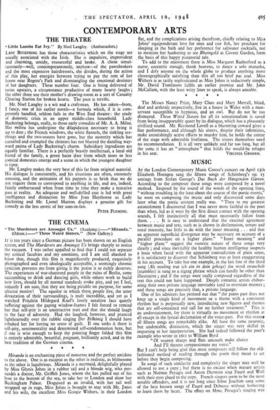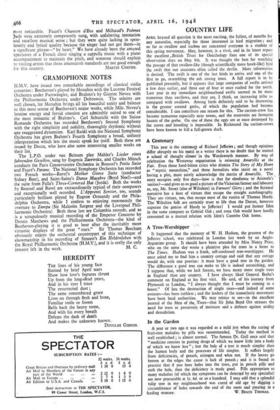MUSIC
AT the London Contemporary Music Centre's concert on April 13th Elizabeth Hoengen sang the fifteen songs of Schonberg's op. 15 settings from Stefan George's Das Buch der Hiingenden Garden. According to the composer these songs were composed by a novel method. Inspired by the sound of the words of the opening lines, " without troubling in the least about the course of the poetic events," he went on composing the music and only discovered some days later what the poetic content really was. " Then to my greatest astonishment I discovered that I was never more faithful to the poet than when, led as it were by the first direct contact with the opening. sounds, I felt instinctively all that must necessarily follow from them. . . . It is easy to understand that the external agreement between music and text, such as is shown in declamation, tempo and tonal intensity, has little to do with the inner meaning . . . and that an apparent superficial divergence may be necessary on account of a parallel procedure on a higher plane." " Inner meaning " and " higher plane " suggest the esoteric nature of these songs very clearly ; and since inevitably the healthy human intelligence suspects a hoax when faced with the apparent contradiction of plain sense, it is satisfactory to discover that Schonberg was at least exaggerating in his account. To take but one example, in the last line of the third song (Als neuling trat ich eM in dein gehege) the word strauchelt (stumbles) is sung to a zigzag phrase which can hardly be other than illustrative ; and if the songs were really composed regardless of the text this could not have happened. Deeply romantic artists elabor- ating their own private language inevitably tend to overstate matters ; and these songs are precisely that, a private language.
One of his admirers has pointed out that " the piano part does not keep up a single kind of movement or a theme with a consistent rhythm but is perpetually new, introducing new figures and themes that are self-contained and call for no further treatment." This is an understatement, for there is virtually no movement or rhythm at all except in the lyrical declamation of the voice-part. For this reason all fifteen songs are remarkably alike. All have the same neurotic, but undeniable, distinction, which the singer was very skilful in imparting to her interpretation. She had indeed followed the poet's example who wrote in 1611 to William Byrd " Of sourest sharps and flats uncouth make choice And I'll thereto compassionate my voice." But I can't help being glad that most composers still follow the old- fashioned method of reading through the poem they mean to set before they begin composing. In songs of such similarity and complexity the singer may well be allowed to use a copy ; but there is no excuse when mature artists such as Noemie Perugia and Anton Dermota sing Faure and Wolf with their eyes glued to the copy. French singers seem to be the most notable offenders, and it is not long since Irene Joachim sang some of the best known songs of Faure and Debussy without bothering • to learn them by heart. The effect on Mme. Perugia's singing was
most noticeable. Faure's Chanson d'Eve and Milhaud's Parries juifs were extremely competently sung, with unfaltering intonation and excellent musical sense; they were quite lacking in spon- taneity and lyrical quality bcause the singer had not got them—in a significant phrase—" by heart." We have already been the amused spectators of a French choir singing a cappella music with a piano accompaniment to maintain the pitch, and someone should explain to visiting artists that these amateurish standards are not good enough































 Previous page
Previous page